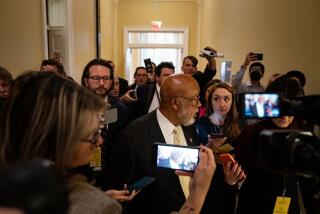Panel Will Push for Mandatory Health Benefits
- Share via
WASHINGTON — A powerful bipartisan commission created by Congress is expected to recommend today mandatory health insurance for all businesses with more than 100 workers and a costly expansion of government-financed nursing home care for the elderly.
However, the Pepper Commission report will avoid the key question of how to finance the proposed $50-billion-a-year health program, saying only that the group supports “raising whatever additional revenues are necessary.”
The 15-member group, which includes key House and Senate leaders on health issues from both parties, will vote today on final approval of an ambitious agenda of health care reform. But the majority probably will be narrow, and dissenting reports are likely.
The White House has asked Republicans on the commission to oppose any programs that would require new taxes. And a dissident Democratic member, Rep. Pete Stark (D-Oakland), said he will not support the report “until it breaks down the costs, so people will know how much is coming out of their own pockets.”
The commission report is certain to intensify the growing national debate over health care reform. Members of Congress are struggling to address the seemingly contradictory goals of providing protection for the 37 million Americans who currently lack health insurance while trying to slow the runaway inflation in medical costs.
The report will recommend that all companies with more than 100 workers “provide private health insurance . . . or contribute to a public plan for all employees and non-working dependents,” according to a draft obtained by The Times.
About two-thirds of the 37 million uninsured Americans are full-time workers and their dependents. Many small businesses have been unable to purchase affordable health insurance, and they are expected to strongly oppose any efforts in Congress to make coverage mandatory.
To address that opposition, the Pepper Commission report proposes that the government offer tax credits and subsidies to “stimulate voluntary coverage” among small companies.
A public insurance program financed by tax revenues would provide coverage for the unemployed and their dependents who make up the other third of the 37 million uninsured Americans.
In another major recommendation, the commission proposes that the federal government pay for the first three months of care received by patients in nursing homes, the most threatening catastrophic expense facing the nation’s elderly.
Medicare currently does not cover the costs of custodial service in a nursing home, the type of care typically received by persons suffering from Alzheimer’s disease and other incurable conditions. The government pays the bills only after a patient exhausts virtually all savings and becomes qualified for Medicaid (Medi-Cal in California), a welfare program.
The commission report also proposes creation of a major new program to provide community-based home care for severely disabled Americans of all ages.
The commission’s proposals would require new legislation. There is little chance of approval this year because of the determined opposition of the Bush Administration, which remains staunchly opposed to any government initiative requiring higher taxes. And members of Congress, stung by last year’s revolt among the elderly against Medicare’s catastrophic care program, are reluctant to suggest new taxes.
Even so, the Pepper Commission’s report is likely to set the terms of debate for the next several years over health care reform.
Named for its first chairman, the late Rep. Claude Pepper (D-Fla.), the commission was created in 1988 with passage of the Medicare catastrophic care legislation. It was assigned the difficult mission of devising a comprehensive health program for the uninsured and those who need long-term care.
The Medicare catastrophic care legislation was repealed last year in response to a wave of bitter complaints from taxpayers over 65 who were outraged by the special tax used to finance the program. But the Pepper Commission was left intact, and it continued to work under a new chairman, Sen. John D. (Jay) Rockefeller IV (D-W. Va.). The commission report is vague on the issue of financing, mentioning higher taxes without providing details.
“The final tax package ought to be progressive, requiring a higher contribution from those most able to bear increased tax burdens,” the report says. Persons of all ages should contribute to the program, and “revenues chosen should grow fast enough to keep up with benefit growth” so additional new taxes will not be needed.
Rep. Stark, chairman of the health subcommittee of the House Ways and Means Committee, said he believes the failure to specify proposed new taxes could be a politically fatal error.
“I don’t care whether it’s a sales tax, or a gas tax or an income tax, you have to define it to the public,” Stark said. “We don’t define it.”
The commission report discusses the whole program, when it should explain the personal costs in taxes for ordinary Americans, Stark said.
“The only kind of person who can understand $50 billion is Rockefeller and (Sen. John) Heinz (R-Pa.),” said Stark, referring to two commission members who are multimillionaires.
“I can’t understand that kind of money, and my Mom can’t either,” he said. “That’s why we lost on catastrophic.”
More to Read
Get the L.A. Times Politics newsletter
Deeply reported insights into legislation, politics and policy from Sacramento, Washington and beyond. In your inbox twice per week.
You may occasionally receive promotional content from the Los Angeles Times.








